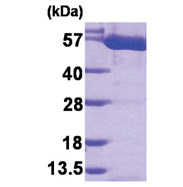PKM2 (1-531, His-tag) Human Protein
Other products for "PKM"
Specifications
| Product Data | |
| Species | Human |
| Expression Host | E. coli |
| Expression cDNA Clone or AA Sequence |
MGSSHHHHHH SSGLVPRGSH MSKPHSEAGT AFIQTQQLHA AMADTFLEHM CRLDIDSPPI TARNTGIICT IGPASRSVET LKEMIKSGMN VARLNFSHGT HEYHAETIKN VRTATESFAS DPILYRPVAV ALDTKGPEIR TGLIKGSGTA EVELKKGATL KITLDNAYME KCDENILWLD YKNICKVVEV GSKIYVDDGL ISLQVKQKGA DFLVTEVENG GSLGSKKGVN LPGAAVDLPA VSEKDIQDLK FGVEQDVDMV FASFIRKASD VHEVRKVLGE KGKNIKIISK IENHEGVRRF DEILEASDGI MVARGDLGIE IPAEKVFLAQ KMMIGRCNRA GKPVICATQM LESMIKKPRP TRAEGSDVAN AVLDGADCIM LSGETAKGDY PLEAVRMQHL IAREAEAAIY HLQLFEELRR LAPITSDPTE ATAVGAVEAS FKCCSGAIIV LTKSGRSAHQ VARYRPRAPI IAVTRNPQTA RQAHLYRGIF PVLCKDPVQE AWAEDVDLRV NFAMNVGKAR GFFKKGDVVI VLTGWRPGSG FTNTMRVVPV P
|
| Tag | His-tag |
| Predicted MW | 60.1 kDa |
| Concentration | lot specific |
| Purity | >95% by SDS - PAGE |
| Presentation | Purified |
| Buffer | Presentation State: Purified State: Liquid purified protein Buffer System: 20 mM Tris-HCl buffer (pH 8.0) containing 10% glycerol |
| Bioactivity | Specific: > 25,000 pmol/min/ug. One unit will convert 1.0 pmole of phospho(enol)pyruvate to pyruvate per minute at pH 7.5 at 37°C. |
| Endotoxin | < 1.0 EU per 1 microgram of protein (determined by LAL method) |
| Preparation | Liquid purified protein |
| Protein Description | Recombinant human PKM2, fused to His-tag at N-terminus, was expressed in E.coli and purified by using conventional chromatography. |
| Storage | Store undiluted at 2-8°C for up to two weeks or (in aliquots) at -20°C or -70°C for longer. Avoid repeated freezing and thawing. |
| Stability | Shelf life: one year from despatch. |
| Reference Data | |
| RefSeq | NP_001193725 |
| Locus ID | 5315 |
| UniProt ID | P14618 |
| Cytogenetics | 15q23 |
| Synonyms | CTHBP; HEL-S-30; OIP3; p58; PK3; PKM2; TCB; THBP1 |
| Summary | This gene encodes a protein involved in glycolysis. The encoded protein is a pyruvate kinase that catalyzes the transfer of a phosphoryl group from phosphoenolpyruvate to ADP, generating ATP and pyruvate. This protein has been shown to interact with thyroid hormone and may mediate cellular metabolic effects induced by thyroid hormones. This protein has been found to bind Opa protein, a bacterial outer membrane protein involved in gonococcal adherence to and invasion of human cells, suggesting a role of this protein in bacterial pathogenesis. Several alternatively spliced transcript variants encoding a few distinct isoforms have been reported. [provided by RefSeq, May 2011] |
| Protein Families | Druggable Genome |
| Protein Pathways | Glycolysis / Gluconeogenesis, Metabolic pathways, Purine metabolism, Pyruvate metabolism, Type II diabetes mellitus |
Documents
| FAQs |
| SDS |
Resources
Recombinant Protein Resources |
{0} Product Review(s)
0 Product Review(s)
Submit review
Be the first one to submit a review
Product Citations
*Delivery time may vary from web posted schedule. Occasional delays may occur due to unforeseen
complexities in the preparation of your product. International customers may expect an additional 1-2 weeks
in shipping.






























































































































































































































































 Germany
Germany
 Japan
Japan
 United Kingdom
United Kingdom
 China
China
